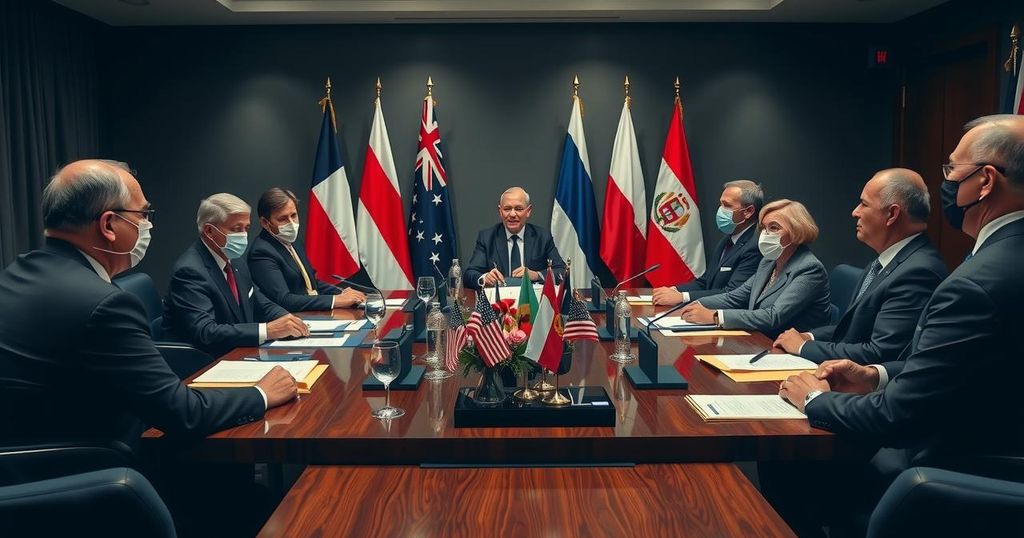Blinken Concludes Ambitious Week of Diplomatic Engagement in the Middle East

Secretary of State Antony Blinken concluded a week of diplomatic activities focusing on stabilizing the Middle East through discussions with leaders from the UAE, Lebanon, and Jordan. Key topics included ending the conflict in Gaza, supporting humanitarian efforts, and the enforcement of UN resolutions to ensure regional stability.
Secretary of State Antony Blinken concluded a significant week of diplomatic engagement across the Middle East with discussions in London on Friday involving key figures such as United Arab Emirates Foreign Minister Sheikh Abdullah bin Zayed Al Nahyan, Lebanese Caretaker Prime Minister Najib Mikati, and Jordanian Deputy Prime Minister and Minister of Foreign Affairs and Expatriates Ayman Safadi. The talks with Minister Al Nahyan focused on efforts to conclude the conflict in Gaza and to secure the release of hostages. Furthermore, they deliberated on the future following the cessation of hostilities. In relation to Lebanon, Secretary Blinken highlighted the vital need for a diplomatic solution that aligns with the United Nations Security Council Resolution 1701. He acknowledged the UAE’s ongoing humanitarian contributions to Lebanon and Gaza. During his meeting with Prime Minister Mikati, Blinken reiterated the commitment of the United States to facilitate a diplomatic resolution to the conflict in Lebanon, ensuring the full implementation of the aforementioned UN resolution. He expressed support for the Lebanese government, its legitimate institutions, and the armed forces while emphasizing the urgency of addressing the humanitarian crisis. In his dialogue with Deputy Prime Minister Safadi, Blinken acknowledged Jordan’s pivotal role as a collaborator with the United States in the region. He emphasized that both nations were engaged in concerted efforts to amplify humanitarian assistance to Palestinians in Gaza, stating that Jordan had exhibited remarkable leadership in this regard. Blinken characterized the week’s discussions surrounding the Gaza conflict as both productive and timely. He acknowledged the necessity for security along the Israeli-Lebanese border to allow displaced individuals on both sides to return home. Safadi raised alarms about the precarious situation, articulating that the region stands on the brink of war and that immediate diplomatic engagement is critical to alleviating tensions. Safadi pointed out the complexities arising from Israeli actions, describing the ongoing military operations as aggressive and calling for their cessation. He underscored the dire humanitarian conditions in Gaza and the implications these have for regional stability. He further stressed the need for the enforcement of Resolution 1701 to help save lives and alleviate the civic dislocation in Lebanon. Blinken reaffirmed the necessity of prioritizing diplomatic solutions and protecting civilians amidst the conflict, reiterating the integral role of diplomatic resolution in promoting regional stability.
The Gulf region has recently been a focal point of intense diplomatic activity, with the ongoing conflict in Gaza and its repercussions in neighboring Lebanon and Jordan serving as catalysts for discussions among key political figures. The negotiations aim to address the urgent humanitarian crises and foster a stable environment conducive to peace, guided by international resolutions such as UN Security Council Resolution 1701. The discussions underscore the importance of collaboration among nations to navigate the complexities of regional tensions arising from military actions and the necessity of diplomatic interventions to secure peace.
The discussions held by Secretary of State Antony Blinken with officials from the UAE, Lebanon, and Jordan highlight a concerted effort to navigate the challenges posed by the ongoing conflict in Gaza and regional instability. By prioritizing diplomatic resolutions, reaffirming support for humanitarian efforts, and proposing strategies for post-conflict recovery, these dialogues represent a crucial step towards fostering peace and stability in the Middle East. It is evident that the involvement of external partners, such as the United States, is essential in addressing the complex dynamics that threaten the region’s security.
Original Source: www.jpost.com








